Baltimore Symphony Performs “OrchKids Nation”
The Baltimore Symphony recently did something that I’d wager has never been done before in the history of American orchestras – they invited their young students from an inner-city school program to perform on a subscription series concert.
The program is called OrchKids, and was started by BSO Music Director Marin Alsop and Dan Trahey, Artistic Director of OrchKids, in 2008. I spent a few days with the OrchKids program in April 2010, and wrote a detailed article for Polyphonic describing what the program does with the kids on a daily basis.
What intrigues me about this concert is that the kids were front-and-center part of a regular subscription concert at Meyerhoff Hall, not at a Family concert or a concert where students are bused in to the symphony’s hall in the morning. This was two regular weekend subscription concerts; the program included Corigliano’s Pied Piper Fantasy and Prokofiev’s Cinderella.
OrchKids was inspired by El Sistema, the Venezuelan orchestral training program that produced Gustavo Dudamel, Music Director of the Los Angeles Philharmonic, and has changed the lives of so many young people in Venezuela and elsewhere. El Sistema USA is helping American orchestras, cities and conservatories to create similar programs in the US.
Baltimore’s program began at the Harriet Tubman Elementary School and moved to the Lockerman-Bundy Elementary School in West Baltimore in the fall of 2009. The students participating in OrchKids have intensive music instruction from 3:30 to 6:15 four days a week, with occasional Saturday activities. All the students in the school receive music instruction during their normal school hours.
For the BSO concert, the kids played a piece called OrchKids Nation, composed by David Rimelis, who has been writing music for Marin Alsop for thirty years, starting with her jazz string quartet String Fever. He was involved with The Concordia Ensemble’s educational programs in NY, and wrote for the Colorado Orchestra when Ms. Alsop was in Denver.
To create OrchKids Nation, David went to Baltimore 4-5 times to watch the kids, speak with their teachers, and come up with a plan. He decided that this would be a composition for the kids, with the orchestra as the accompaniment. He told me that he didn’t want the orchestra to play for more than 8 measures without the kids being involved.
But a serious compositional problem arose: identifying which notes the kids knew how to play, given that some were playing trumpet or trombone, others flute or clarinet, and others violin or cello. And the group had some 3rd year kids who can play pretty well mixed in with the 1st year kids who have just started. The common ground was D and G, and maybe an A. According to Dan Trahey, the kids were all playing slightly different parts, written by Dan and Nick Skinner (the OrchKids Site Manager), and based on David’s original composition, that reflected what each student was able to play. None of the kids had been playing longer than 18 months!
The piece was written to feature the vocal and instrumental talents of the OrchKids; the lyrics (see the last page) were taken from testimonials written by the students in the program. They wrote on topics such as their favorite instrument, how the music makes them feel, and what they like about the OrchKids program.
To quote composer Rimelis, “The music of the first section is centered around the dance rhythms of the OrchKids Bucket Band [taught by BSO percussionist Brian Prechtl] and drums, coupled with the BSO orchestra percussion. On top of the rhythms, the students and professional musicians engage in lively musical conversations. The musical interplay is punctuated by the OrchKids’ rap, and a vocal call and response section. The middle section features the student string and mallet instrument ostinatos with soft vocal sounds weaving in and out. These elements, combined with the orchestral background, create a musical tapestry that builds to the first climax featuring the OrchKids drummers and both orchestras. In the last section the music recedes and the choir enters, softly singing the OrchKids theme. They are joined by the entire OrchKids ensemble singing. The BSO enters and takes the piece to its final climax. OrchKids Nation is approximately 9 minutes in duration.”
Here’s a link to Tim Smith’s blog page (Baltimore Sun), which has a video of an OrchKids Nation rehearsal.
David Rimelis took any phrase he thought was interesting or insightful, and weaved all of them into lyrics. The basic message is “We’re OrchKids and we’re making music.” He included a little rap: “We got a tuba and a trumpet and a double bass/ We fill the school full of music – it’s an awesome place / we wanna play…” to make it more fun for the kids.
David said that he knew what he was getting into when he wrote the piece. Part of it is the performance; the other part is all the time it takes to prepare the piece. “I wanted the kids to get that the music will always be there for them. Part of this was learning and internalizing the words and the idea. As Dan [Trahey] keeps saying, these kids aren’t going to go on to play in the BSO – maybe one out of a thousand might – but if they go on to internalize the music and realize how important it is to make their life whole, the job is done. The kids were excited – they didn’t sing as loud as I had hoped, but they put out a lot of energy.”
I asked David about the reactions he got from the BSO musicians. He said that some thought it was really fun – there was a lot of interaction with the percussion section. He was trying to get them to follow the kids. But it wasn’t about the BSO – it was about the orchestra supporting the kids.
Chang Woo Lee, Associate Principal Cellist, was sitting in the front and was particularly interested in seeing how the kids reacted to the whole thing. At the first concert she noticed that one of the cellists had a particularly promising bow arm and intended to encourage her, but the girl didn’t show up for the second concert. She was quite disappointed, and Dan told her that she got an earful from her teachers!
Regarding the concert itself, she thought “the program was excellent; one of the best that Marin has come up with. I was looking at the kids and thinking how lucky they are – as we know they might not have had such great opportunities in the past. I was wondering how they will apply this to whatever they end up doing in their lives.” She stressed how important it is for the kids to always practice and play concerts, but it’s equally important for the parents to get involved and not just let children be dependent on their teachers. She also pointed out that Marin’s focus was on the kids and admitted that, even though it was not great music making for the BSO musicians, most thought it was a fabulous program. According to Chang Woo, when OrchKids first started, the BSO musicians didn’t understand what it was all about, but now they really think that it’s money worth spending. “The musicians are really behind what Marin is doing with the OrchKids program.”
Nick Skinner is the site manager for OrchKids, has an office in Lockerman-Bundy School, and had a lot of the responsibility of actually making the performance happen. In essence, he feels that the kids did a great job and really rose to the occasion. “They really stepped up and understood how important this was – all the work they’d been doing went into this one event. To see kids from West Baltimore performing with the BSO – it was an amazing feat for those children.”
The logistics were a bit of a nightmare (they were at the Meyerhoff three times that week, plus rehearsals after school and practicing at home), and unfortunately some of the kids missed the Sunday performance (for a variety of reasons). And he and Dan were very meticulous about impressing upon the kids why they were there – if a student presented any problems, s/he dropped back into the choir. But some were then so well behaved that they earned back the right to play their instruments. “We can tell the kids over and over again how important this is and what the opportunity means. But for them, it was the attention and rewards coming from their parents, and the audience’s reaction of standing and applauding, that was so very positive. They don’t get that kind of reaction very often. Most of them didn’t grasp until the actual performance how important is was – same for the parents. The concert exposed them to what the OrchKids program is capable of doing for their children. And what being involved in something positive can mean for the kids.”
“Dan and I sat back and watched – it’s only a 3 year-old program! It was pretty incredible what these children have been able to accomplish in 3 years. In terms of behavior – these kids are transformed from what their life was like before.”
I spoke with three of the performers:
Malic, a 10 year-old 3rd grader, plays the flute and told me that he was very excited to play with a symphony orchestra and was very proud of himself for being at Meyerhoff Hall. He also said that he “worked really hard to play well for Miss Marin.” I asked him about wearing the OrchKids T-shirt, and he said it was a source of pride when he puts it on. According to Dan, Malic had had a tremendous amount of behavior problems, so they told him that he couldn’t play his flute unless his behavior improved. Well, his behavior has skyrocketed.
Arriana, who is 12 and in the 5th grade, plays the violin, but she’d only been playing since September. (Dan and Nick made an exception for her and let her join the program even though she’s older because she was so insistent in asking them.) She told me that she practiced a lot; it was hard but it was a lot of fun. Her mother made her practice at home. I asked her what she remembered of the performance – she remembered playing for the conductor and bowing at the end. “Miss Marin is a great conductor and I hope to be like her some day.” She also told me that she really liked that everybody came very presentable: “Every one took a shower that morning.” She thought the whole piece was magnificent and even her mother was proud of her (Dan says she has a tough mom). She also told me that she really enjoyed that within the OrchKids there were multiple ensembles – Miss Molly’s choir, the bucket band, and the orchestra.
Tytamara is a 10 year-old 4th grader who plays the trumpet. “All the teachers were strict about us playing good; at the end they were clapping for like 10 minutes. They stood up and clapped. My mother liked it. It was fun to play with the BSO – they played a different part. We had to be extra quiet – when we were in the OrchKids room, we had to be quiet because the concert was going on. I was a little nervous but then I was thinking that I was the only one there playing.” She was struck by the volume level, and that there were “a whole bunch of microphones.” And she left me with the thought that “the BSO trumpets were very nice and sounded good!”
I asked David Rimelis about the future life of the piece. “I’d love the piece to travel and have other performances, but I didn’t write it for that reason. Also, I looked at what they had – bucket brigade, these numbers of instruments of cello, bass, violin, sax, trombones, baritone horns, 1 French horn, several flutes, trumpets, clarinets, no double reeds, xylophones, and bucket band doubled on finger cymbals and triangles. Also singers, hand clapping, and ham boning. So I wrote the piece to fit what they had.”
David considers the piece to be just a form that you can put the kids into. He’s not in love with any particular part of it and is fine with teachers making changes to fit it to specific kids. “They ended up playing most of what I asked them to play. The performance was the most important thing – and the confidence level of the kids.”
In summing up, Dan Trahey told me that in most orchestras, he feels that education gets pushed aside because orchestras are concerned about selling tickets and raising funds. But in Baltimore, OrchKids is part of their mission from Paul Meecham, the CEO, and Marin Alsop, the Music Director, down to the kids in the OrchKids program.
Perhaps the most interesting thing Dan told me is that the kids refer to themselves as members of the Baltimore Symphony Orchestra, not as part of OrchKids. They’re BSO members! And indeed they were for one very special weekend.
“OrchKids Nation” Lyrics
(Rap)
We got a tuba and a trumpet and a double bass
we fill the school full of music it’s an awesome place
we wanna play we wanna play
it could be jazz’er maybe hip hop or a lullaby,
we got a song to make you laugh an one to make you cry
we wanna play we wanna play
we wanna play play play play
music every minute every hour every day
sing
we’re OrchKids
cause we choose it,
we’re learnin’
we’re makin’ music
Got talent
we use it
We’re OrchKids,
We’re makin’ music
We’re makin’ music
We’re makin’ music
Somethin’ big is happenin’ here in Baltimore,
Kids are makin’ music like they never have before,
Blowin’ on the trumpet playin’ violin,
playin’ games with music that we know we’re ganna win,
we’re OrchKids
we choose it,
We’re learnin’
we’re makin’ music
Get up every morning to a tune inside our head,
every night we sing it just before we go to bed,
it always makes us happy, it always keeps us strong,
when we’re in our music we are right where we belong,
OrchKids takes us there,
music we can share,
Learnin’ as we’re playin’ and we always make it fun,
that’s how OrchKids takes us there
(Rap)
We got a tuba and a trumpet and a double bass
we fill the school full of music it’s an awesome place
we wanna play we wanna play
it could be jazz’er maybe hip hop or a lullaby,
we got a song to make you laugh an one to make you cry
we wanna play we wanna play
we wanna play play play play
music every minute every hour every day
(sing)
OrchKids takes us there,
Music we can share,
playin’ as we’re learnin’ and we always make it fun,
that’s how OrchKids takes us there
we’re OrchKids
we choose it,
we’re learnin’
we’re makin’ music
Got talent
we use it
We’re OrchKids,
We’re makin’ music
We’re makin’ music
We’re makin’ music

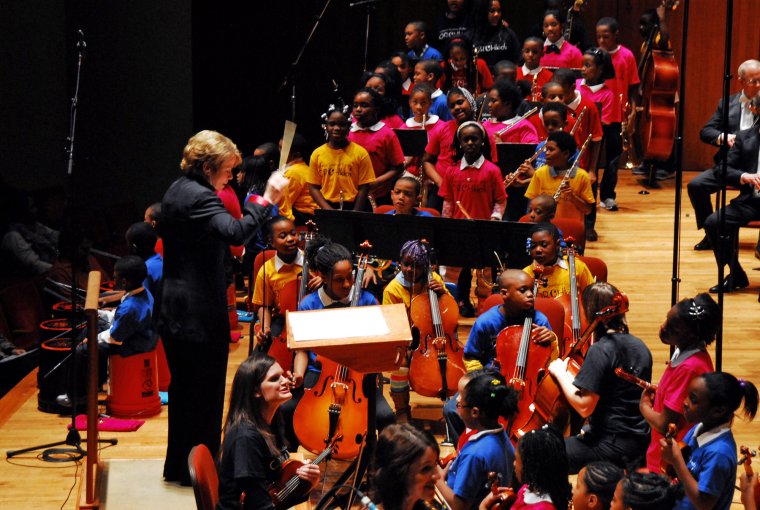
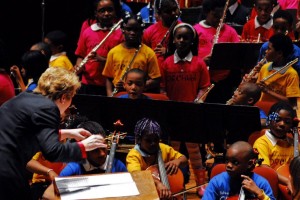
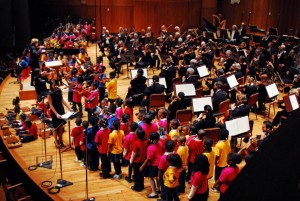
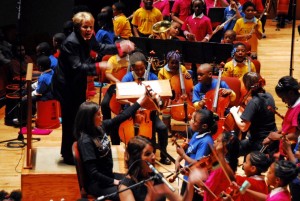
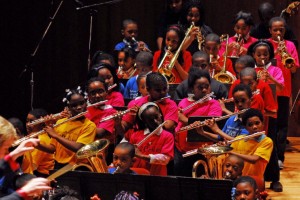
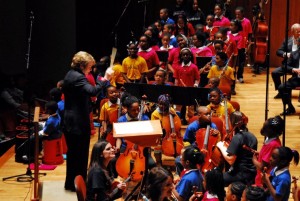
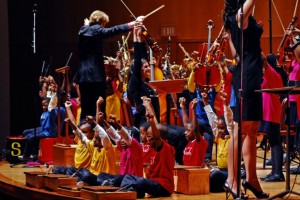
No comments yet.
Add your comment